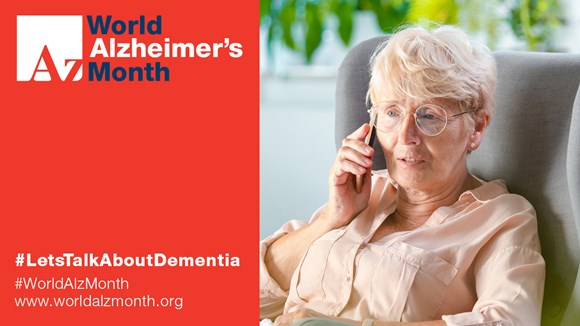World Alzheimer's Month is the international campaign by Alzheimer's Disease International to raise awareness of and challenge the stigma that surrounds dementia.
Today marks the beginning of World Alzheimer's Month which takes place every September to raise awareness and to challenge stigma. Alzheimer’s disease and vascular dementia are the most common types of dementia, responsible for up to 90% of cases. There are currently around 850,000 people with dementia in the UK, a number which is projected to rise to 1.6 million by 2040.
People with dementia are among the most vulnerable in society, so it’s vital that public-facing organisations like energy network companies understand the condition and how their staff can offer help and understanding. The networks are committed to supporting their customers living with dementia and can help to reduce some of the natural worries and fears associated with energy supply. It is therefore important that the right policies, procedures and practices are in place to support both customers and staff with regards to dementia.
Energy networks companies have taken steps to help their staff understand what it’s like living with dementia by getting involved with the Alzheimer’s Society’s Dementia Friend initiative.
A Dementia Friend shares with people more about what it’s like to live with dementia and turn that understanding into action. Each person who becomes a Dementia Friend carries their dementia awareness with them out into their own communities and in their everyday lives, making a difference everywhere to people living with the condition.
This is particularly important for frontline teams in the network companies, whether in operations or in the call centres, to help them to provide a better and more inclusive service to their customers. Anyone household with someone who suffers from dementia should also sign up to the free Priority Services Registers to ensure that those who need extra help receive it from trained advisors.
The energy network companies invest heavily to make sure that their networks are as reliable as possible and although they have never been more resilient, on the occasions incidents like power cuts occur, they want to ensure that those who are vulnerable, or become temporarily vulnerable, receive the help they need.
Practically the gas networks can help with additional measures. They can fit - for free - safety devices (locking cooker valves) that prevent gas being left on unintentionally. When the valve is locked, the gas supply to the cooker is stopped. This eliminates the risk of the cooker being unintentionally turned on or left on and gives peace of mind to carers or relatives that the cooker can’t be used when they leave the house or the room. The carer or relative can easily turn the valve on using the key when the cooker is required, enabling the household to continue to use their gas cooker safely.
As we manage the long-term effects of the coronavirus pandemic during local lockdowns and restrictions, it is vital to keep talking about dementia, seeking out information, advice and support and for older people, especially those living with dementia, to make sure they receive assistance and guidance. Energy network companies are playing their part in helping to provide that support and the piece of mind they need.
Press contacts for journalists
Peter Kocen
Senior Press and Public Affairs Manager
+44 (0)7792 220 974
peter.kocen@energynetworks.org
ENA Press Office
Notes to editor
Learn more about World Alzheimer's Month
Learn more about the free Priority Services Register
Find out who your electricity & gas network operators are
Learn more about staying safe and guarding against bogus callers on the doorstep
About Energy Networks Association
Energy Networks Association (ENA) is the industry body representing the electricity wires, gas pipes and energy system in the UK and Ireland.
ENA helps its members meet the challenge of delivering electricity and gas to communities across the UK and Ireland safely, sustainably and reliably.
Its members include every major electricity and gas network operator in the UK and Ireland, independent operators, National Grid ESO which operates the electricity system in Great Britain and National Gas which operates the gas system in Great Britain. Its affiliate membership also includes companies with an interest in energy, including Heathrow Airport and Network Rail.
What are energy network operators?
Energy network operators manage and maintain the wires, pipes and other infrastructure which delivers electricity and gas to your home, business and community. They are private companies which are regulated by Ofgem and employ around 40,000 people in Great Britain.





